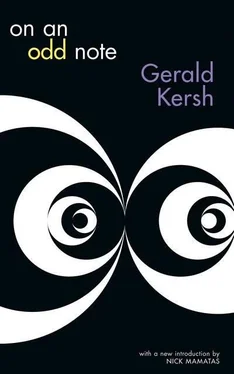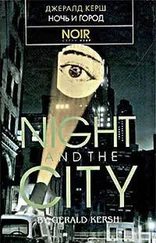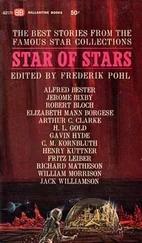ON AN ODD NOTE
Gerald Kersh
With a new introduction by
NICK MAMATAS
INTRODUCTION
The Man Who Was in Every Story, or, The Murdered Darling
Can there be a more ridiculous thing in the world than an introduction to a volume of Gerald Kersh’s fiction? There cannot. These are the first pages of On an Odd Note and you, reader, have already climbed the summit of the insane. If this book is in your hands, you know of the glory of Kersh’s prose, and so nothing I say matters. If this book isn’t in your hands then you’re not reading about Gerald Kersh, or your hands, right now, and I may as well stop typing.
Gerald Kersh was once famous. Now he’s not even obscure. One novel, Night and the City , remains fairly widely circulated, and that mostly on the strength of the first of its two film adaptations, which regularly makes various Best Film Noir lists in print and on the Internet. It’s a great film, but its greatness comes only from removing virtually everything of Kersh—his humor, his endless asides that lead the reader down primrose paths to the darkest of alleys, his hard-won close knowledge of the sport of wrestling (and the faux techniques of professional wrestling), the self-destructive interiority of his characters—and replacing it with neo-expressionist cinematography.
Gerald Kersh was not a neo anything.
I’m writing from Berkeley, California, the home of several nationally famous new-and-used bookstores: none of them have even a single Kersh title on their shelves. The local library has Night and the City on DVD, and four anthologies with Kersh stories, most of them about his famed criminal character Karmesin. Nearby San Francisco manages little better; its large library system contains three anthologies that include Kersh stories, the film, and a copy of his prescient novel of global flooding, The Secret Masters . The online catalogue had the gall to ask me if I mean “Kerbs Gerald” instead. Who the hell is Gerald Kerbs? (As it turns out, it isn’t anybody.)
If you’re reading these words, none of what I’ve said so far is new to you. One doesn’t even discover Kersh on the shelves of a dusty old bookstore anymore, one must be initiated into Kersh by someone who knows. Perhaps someone who saw the film and then dared the Night and the City novel, and from then on was consumed. Maybe someone who is slightly older, and remembers when Kersh was a prolific writer of short stories, or who owns an old book. A copy of Prelude to a Certain Midnight —a crime novel about what a Miss Marple type would really be like—was pressed into my hand a few years ago. Members of the cult of Harlan Ellison may find their way into the smaller sub-cult of Kersh, like a Freemason earning through mystic rite the mystic right to wear ever more ridiculous hats.
Yet, once upon a time, Kersh was ubiquitous. The stories in On an Odd Note originally appeared in the great slicks: Esquire , Playboy, Cosmopolitan , and The Saturday Evening Post , and also Today, the Philadelphia Inquirer magazine. Remember when every major newspaper had its own Sunday magazine supplement? When Cosmopolitan ran fiction? “The Extraordinarily Horrible Dummy” was once routinely reprinted. “The Brighton Monster” was called one of the best fantasy time travel stories of all time by encyclopedist Don D’Ammassa. And now, almost nothing remains of Kersh, at least in the United States. He’s largely out of print, almost entirely deaccessioned, and rarely discussed. So here we are, then.
One’s first instinct is to blame the work. Most of the stories you’ll read in this volume have an O. Henry or Twilight Zone -style twist. “The Sympathetic Souse” is a fairly weak story because of its twist, but for the most part the work holds up, despite the seeming flaw of the “gotcha” ending. We know this for one simple reason: the stories are worth re-reading. Kersh is a master of the conversational detail, the slow burn, and of the piquant self-insertion. The stories are not about a twist, they are about everything leading up to the twist, including Kersh himself. “Gerald”, “Mr. Kersh”, and occasionally just an “I” telling a story about a story he heard once.
Kersh is a great writer because he eschewed the writing advice of Arthur Quiller-Couch: “Whenever you feel an impulse to perpetrate a piece of exceptionally fine writing, obey it—whole-heartedly—and delete it before sending your manuscript to press. Murder your darlings .” Kersh never murdered his darlings; he’d kill everything else first. A story seemingly about the discovery of a new species on a distant island ties into the term grouch bag —Merriam-Webster will only tell you that a grouch bag is a purse, and nothing of its history or shape—and from there we get a countess, and a giant, and murder, and the stunning social fact that unrelated little people often look alike to those of average height. These stories are all Kersh, all darlings—forget on an odd note, these tales are composed completely of nothing but odd notes.
What happened to Kersh is what will happen to all of us: he died. It’s a cliché that writing confers a type of immortality, but in truth most writers outlive their books. Kersh kept plugging away until nearly the end, despite declining health, but publishers and readers forget when a writer isn’t there to remind them of his existence.
After Kersh’s death, there was a sea change in publishing. In the realm of slick fiction, Raymond Carver and his epigones took over the slots once reserved for short stories in Esquire , The Atlantic , et al. Kersh’s stories are thoughtful and often involve people discussing their lives, but then he adds something: events. Events actually occur in Kersh’s fiction. We can’t have that!
In science fiction, the 1960s and 1970s saw the rise and fall of New Wave, which paved the way for cyberpunk in the 1980s. Kersh’s science fiction and fantasy suddenly felt rather quaint, being neither phantasmagorical nor hard-bitten. There was no more room for stories of sophisticated men and women, and those just imitating sophistication, exploring ever-so-fascinating phenomena with a cynical eye.
Ditto crime/mystery fiction, in which the protagonists of new series simply had to be alcoholics with sexual problems—joy, whimsy, cleverness were all remanded to the cozies. There is plenty of booze and sex in Kersh’s work, but for the most part his characters can handle a fifth of whisky. And if they can’t, it is the height of moral approbation for a maître d’ character to step in and help soothe and maintain the poor poor dear.
But Gerald Kersh is not just another old-fashioned writer. His work remains vibrant and relevant. His lengthy asides on grappling and jujitsu predate and predict the current rage for mixed martial-arts competitions. He nailed a prediction of the end of the Cold War to within five years, and hinted at the geopolitical chaos to come. Kersh unsentimentally wrote about child murderers and gender roles, casual corruption in journalism, the poison of racism, and all the social and cultural issues we’re still working over in our fiction and in the great conversation of society. The world is ready for a Kersh revival, but what is to be done?
The stories in On an Odd Note often occupy small narrative universes. There are only a few characters in each tale, and sometimes one that seems obscure or marginal ends up becoming key to the story. And so too, in this introduction: there is Kersh, there is me, and there is you. How can Kersh make his comeback? It’s up to you. Here’s a non-ridiculous suggestion for anyone ridiculous enough to have read so far: you have this book in your hand, so now get a second copy and give it away to someone—like a Seed of Destruction in reverse—to someone who needs to be in our cult.
Читать дальше






